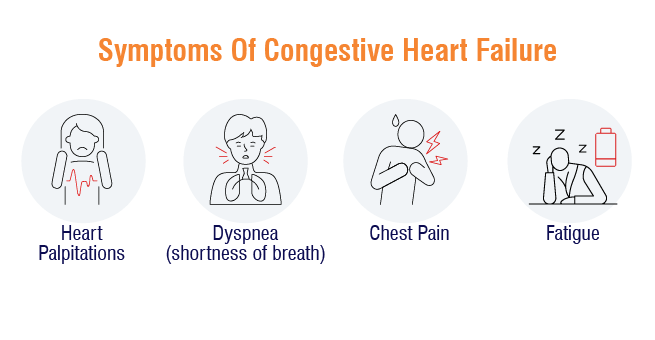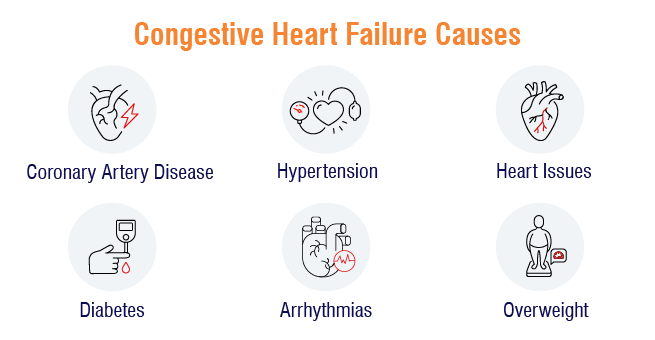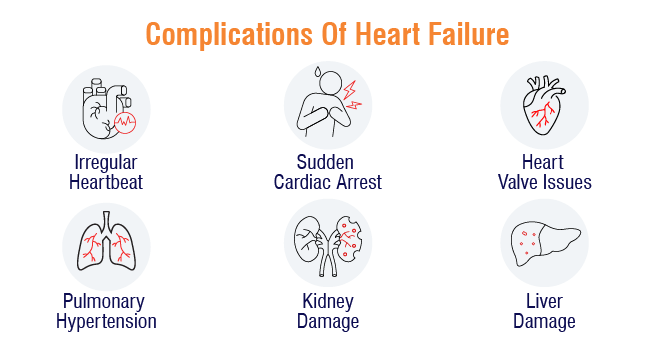Understanding and Managing Heart Failure: A Comprehensive Guide

What Is Heart Failure?
Heart failure, also called congestive heart failure, is a condition that arises when the muscles of the heart don’t pump enough blood to meet the body’s needs, we call that heart failure. This can happen when damage from previous heart attacks causes scars within the heart or when the muscles involved in pumping blood become enlarged and stiff. Heart failure does not mean that the heart is about to stop beating. Hence, proper medical care is required if one is diagnosed with heart failure.
One’s heart can become weak suddenly from an acute state or gradually over time as it becomes weaker, which is known as acute and chronic heart failure, respectively. It can involve either side of the heart, such as the ventricular or atrial ones, meaning that the causes of the left and right ventricular and atrial ones may differ. In most cases, other health problems are responsible for weakening one’s heart, which results in heart failure. This may be caused by coronary artery disease, myocarditis, hypertension, cardiomyopathy, or arrhythmia. Nevertheless, sometimes people suffering from this condition do not show any symptoms.
The diagnosis of heart failure by the doctor depends on medical and family history. Apart from heart failure being a dangerous state without any cure at present, patients who rely on procedures, devices, and some medicines and maintain healthy lifestyles benefit a lot.
Types Of Heart Failure
Congestive heart failure is classified into left-sided, right-sided, and high-output types, with high-output being a rare and uncommon condition. As stated here, they have the following diverse nature:
- Left-sided heart failure: It occurs when the heart’s ability to pump blood is impaired, causing organs to lack oxygen, leading to complications like right-sided heart failure and organ damage. Left-sided heart failure is categorized into:
A. Systolic heart failure: The left ventricle, which is the heart’s bottom pumping chamber, becomes too weak to pump blood out into your body; this condition is also known as heart failure due to low ejection fraction.B. Diastolic heart failure: This is a condition that occurs when the left ventricle is stiff and cannot relax properly, so it does not fill with blood easily. This condition is also termed heart failure with preserved ejection fraction.
- Right-sided heart failure: This occurs when the heart’s right ventricle is too weak to pump adequate blood to the lungs. The accumulation of blood in the veins raises the pressure as the fluid is forced out into other tissues, causing swelling in parts such as the legs and abdomen, also known as right ventricular heart failure.
- High-output heart failure: It is a situation whereby the heart initially functions normally in terms of either a reduced or preserved ejection fraction but gradually loses its ability to meet the increasing demand for more blood by the body, leading to a weakened state of weakly pumping blood from one body part to another.
- Refractory heart failure, or end-stage or advanced heart failure: This is the most severe form of heart failure. Symptoms remain even after treatment and may include shortness of breath, fatigue, leg swelling, frequent hospital stays, etc. Quite often, its incidence is due to conditions like coronary artery disease, hypertension, or cardiomyopathy.
Symptoms And Causes Of Congestive Heart Failure (CHF)
Symptoms of Congestive Heart Failure include:
- Heart palpitations
- Dyspnoea (shortness of breath)
- Chest pain
- Fatigue
- Swelling in abdomen and ankles
- Loss of appetite
- Dyspnoea at rest.
- A hacking or dry cough and more
The symptoms may vary among individuals and worsen over time.There may be times when you show slight congestive heart failure symptoms or no symptoms. These do not imply that you are no longer a victim of this disease. The indicators of the condition vary greatly in intensity and sometimes disappear. It is unfortunate that CHF typically becomes more serious as time goes by. At the late stage of this condition, signs might be more severe or even develop into other ones.
Causes of congestive heart failure include:
- Various factors like coronary artery disease, genetic or viral heart issues, diabetes, hypertension, arrhythmia, kidney disease, BMI over 30, tobacco and recreational drug use, alcohol use and cancer drugs like chemotherapy cause congestive heart failure.
- This congestive heart failure may in turn lead to complications such as irregular heartbeat, sudden cardiac arrest, heart valve issues, pulmonary hypertension, kidney and liver damage, and malnutrition.
What Are The 4 Stages Of Congestive Heart Failure?
Congestive heart failure is a chronic disease that worsens over time. It progresses into four stages (Stages A, B, C, and D), with severe cases remaining or developing at the beginning. The rate and method of progression are unclear. However, the congestive heart failure stages are detailed below:
- Stage A: Heart failure in stage A can be influenced by various factors such as a family history of congestive heart failure, hypertension, diabetes, coronary artery disease, metabolic syndrome, excessive alcohol consumption, rheumatic fever, or cardiomyopathy. Certain cancer medications can also damage the myocardium, leading to its failure. Additionally, certain cancer drugs can damage the myocardium, causing it to fail.
- Stage B: When one has left ventricular dysfunction and/or structural abnormalities without previous signs of heart failure, it is stage B (pre-heart failure).
- Stage C: Stage C heart failure People are those who have a diagnosis of chronic heart failure with congestion and who either have signs and symptoms of the disease currently or have had them in the past.
- Stage D: The final stage of heart failure is marked by the condition known as Stage D HFrEF (heart failure with reduced ejection fraction), in which individuals experience progressive and incurable symptoms.
Management And Treatment For Congestive Heart Failure
Congestive cardiac failure treatment depends on the type of heart failure and its cause. It involves medications and lifestyle changes to slow down the progression of the condition. Stage A treatment includes regular exercise, no tobacco products, high blood pressure treatment, cholesterol treatment, and no alcohol or recreational drugs. Stage B treatment includes medications for Stage A, a beta-blocker, and surgery. Stage C treatment includes treatments from Stages A and B, as well as advanced treatment options like heart transplants, ventricular assist devices, heart surgery, and inotropic drugs. It’s crucial to manage other health conditions.
Right heart failure treatment focuses on the cause, which may not be curable. Lifestyle changes, medications, and heart devices can help manage the condition and improve symptoms, allowing individuals to live an active life and manage their condition effectively.
Left-sided heart failure treatment involves various medications to improve heart functioning, such as ACE inhibitors, ARBs, ARNIs, aldosterone antagonists, beta blockers, digoxin, water pills, and SGLT2 inhibitors. These medications relax blood vessels, control stress hormones, decrease heart rate, and help eliminate excess fluid.
Heart Failure vs. Heart Attack
The main difference between heart attack and heart failure depends on the heart’s functioning:
- Heart attack: Heart attack and heart failure influence the heart in unlike ways. Heart failure is a condition of the heart muscle that impedes the heart’s ability to pump blood. Chest pain or discomfort, light-headedness, fainting, fatigue, or other symptoms may occur in this person. It calls for emergency care, which aims to restore blood flow and avert further damage.
- Heart failure: Heart failure is a continuous condition characterized by the heart muscles becoming weaker with time, eventually leading to a loss of pumping functionality and, hence, insufficient blood circulation by the heart to maintain normal body processes. Symptoms such as tiredness and not having enough air are established gradually and they become worse as time goes by.
Furthermore, even though a heart attack may cause injury on the heart that leads to other heart failure conditions; they do not mean one and the same thing hence distinct ways have to be adopted for each case. On the other hand, heart failure is treated using drugs plus changes in lifestyle besides application of devices in some situations; on the contrary, when someone suffers from heart attack he/she needs urgent medical treatment.
Difference Between Right and Left Heart Failure
Left-sided heart failure occurs when the left side of the heart works harder to pump the same amount of blood to the entire body and is insufficient for daily needs. Left sided heart failure can also lead to right heart failure.
Right ventricular (RV) heart failure, also known as right-sided heart failure occurs when the right ventricle is too weak to pump blood to the lungs adequately. This causes blood to accumulate in the veins forcing water outside them into tissues. So the lower parts of the legs, abdomen or sometimes other body parts become swollen by this excess of liquid.
Can Heart Failure Be Reversed?
Heart failure can’t be cured, but its progression can be stalled and symptoms can be managed for many years. Lifestyle changes, medicines, chest devices, and surgery are the most common treatment options. At times, a combination of the above is required for treatment; hence, one needs continuity of care in most circumstances.
Get Started Now To Improve Your Heart’s Health! Consult Our Specialists Right Away.
Conclusion
Heart failure can be treated with careful attention, especially to the functioning of heart muscle, the symptoms as well as response to treatment, and the treatment regimen. If adults take medications as prescribed, keep active, have a low sodium diet, report any changes in how they feel, and make regular appointments they could improve their lifestyle.
Patients with congestive heart failure may need to limit their intake of salt and fluids on a daily basis with specified guidelines from their healthcare provider. Symptom aggravation for things like breath shortness, swelling, rapid weight gain or constant tiredness should be pointed out to them urgently. For better health of the heart, they should stick to drugs, keep track of their weight changes, set aside days on which they have follow-up sessions as well as track signs.
A cardiologist consultation is needed if one has any questions or concerns about how to effectively manage the treatment plan.
References:
- Introduction: https://www.mayoclinic.org/diseases-conditions/heart-failure/symptoms-causes/syc-20373142
- Types: https://my.clevelandclinic.org/health/diseases/17069-heart-failure-understanding-heart-failure
- Stages: https://www.webmd.com/heart-disease/guide-heart-failure
- Symptoms & causes: https://medlineplus.gov/heartfailure.html
- Management: https://www.healthline.com/health/heart-failure#faq
About Author –























